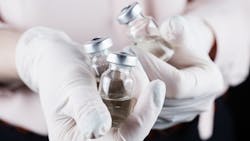A three-dose course of the hepatitis B vaccine HEPLISAV-B fully protected adults living with HIV who had never been vaccinated against or infected with the hepatitis B virus (HBV), according to study findings presented at the IDWeek conference in Washington, D.C. The National Institute of Allergy and Infectious Diseases (NIAID), part of the National Institutes of Health, sponsors the ongoing Phase 3 ACTG A5379 clinical study.
Led by study chairs Kenneth E. Sherman, M.D., Ph.D., of the University of Cincinnati College of Medicine, and Kristen Marks, M.D., of Weill Cornell Medical College, New York City, the researchers tested a three-dose course of HEPLISAV-B among 68 adults living with HIV at 38 sites in the United States, South Africa, and Thailand. None of the participants had received a previous HBV vaccination or had evidence of a previous HBV infection; all were on antiretroviral therapy. Following the initial dose of HEPLISAV-B vaccine 0.5 milliliter (mL) as an intramuscular injection, study participants received additional doses at four weeks and 24 weeks. The objective of this part of the study was to assess anti-HBV surface antibodies (HBsAbs) greater than or equal to 10 milli-international units per milliliter (mIU/mL) at week 28 (defined as seroprotection from HBV) and to assess the vaccine’s safety.
All participants achieved seroprotection with 88% of participants achieving HbsAb levels greater than 1000 mIU/mL, according to findings presented today. High antibody levels are thought to be associated with long-term vaccine durability. At eight weeks after the second dose, 94.4% of participants achieved seroprotection; this percentage increased to 98.5% by week 24 prior to the third dose. The most common side effects related to vaccination were injection site pain, malaise, fatigue, muscle aches and headaches.

